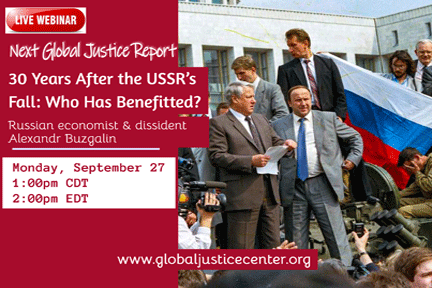Talk: 30 Years After the USSR’s Fall: Who Has Benefitted? [] Center for Global Justice
Event Category: Presentations/Discussions
-
Monday, September 27, 20211:00pm CDT – 2:00pm EDT
Russian economist & dissident Alexandr Buzgalin
This brief history of the wreckage of the 1990s provides context for Alexandr Buzgalin’s comments on who benefitted from Russia’s conversion to “capitalism.” Since the 1980s, Professor Buzgalin has taught economics and self-management at Moscow State University and now also directs the Center for Modern Marxist Studies. In 2018, Paul Jay interviewed him on “Reality Asserts Itself” on The Real News Network. In 12 short episodes, he recounts his life and hopes first as a child, then as a young dissident on the left platform of the Central Committee of the Communist Party. Author of over 20 books and articles, he helps edit the journal Alternatives and is a leader of Russia’s opposition democratic socialist movement called “Alternatives.” This is a chance to hear from a democratic socialist Russian economist and leader of a democratic socialist movement on what’s really happened in Russia and what future US-Russia relations could be like.
“Soviet” means “workers’ council.” After 1917, the USSR’s republics aspired to be unions of workers’ councils–worker self-management was their aim. When the Berlin wall fell in 1989, factions behind Mikhail Gorbachev did not militarily suppress the USSR’s dissolution with the Red Army. Gorbachev let them leave avoiding bloodshed for which he deserves credit. But a coup removed him in 1991 and Boris Yeltsin, the then President of the Russian Republic, side-lined him.
What we do The Center engages in local community support and outreach to promote and advance initiatives and movements toward social justice, grassroots empowerment and democracy, and environmental sustainability. It is also devoted to critical analysis of the processes and impacts of globalization, both local and international. The Center works to develop alternative socio-economic systems that conserve and share the world’s cultural, economic, and environmental resources for the benefit of humankind.


